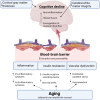Understanding Cognitive Decline in Aging: Mechanisms and Mitigation Strategies - A Narrative Review
- PMID: 40256418
- PMCID: PMC12009036
- DOI: 10.2147/CIA.S510670
Understanding Cognitive Decline in Aging: Mechanisms and Mitigation Strategies - A Narrative Review
Abstract
Cognitive decline is a natural process that accompanies aging. In some cases, such as in sarcopenia-burdened or diseased older adults, the disease course may be more rapid. Declining cognitive function is associated with changes in the central nervous system per se or peripheral triggers that impair cognition. This review discusses issues related to central, central-peripheral, and peripheral factors that enhance cognitive deterioration, such as cortical thickness, cerebral white matter structure and function, blood-brain barrier (BBB) disruption, insulin resistance, inflammation, and vascular dysfunction. BBB permeability appears to be a critical point for factors associated with aging that may accelerate cognitive decline. Thus, we provide an in-depth analysis of the central-peripheral crosstalk. Additionally, we discuss high-intensity interval training (HIIT) as a promising strategy to counteract changes that accompany the aging process. Resistance (RHIIT) and aerobic (AHIIT) may be beneficial for cognitive health among the elderly, but their lack of empirical confirmation is a huge gap in the research.
Keywords: adipose tissue; aging; central nervous system; cognition; exercise; inflammation.
© 2025 Jost and Kujach.
Conflict of interest statement
The authors report no conflicts of interest in this work.
Figures
Similar articles
-
Enrichment Effects on Adult Cognitive Development: Can the Functional Capacity of Older Adults Be Preserved and Enhanced?Psychol Sci Public Interest. 2008 Oct;9(1):1-65. doi: 10.1111/j.1539-6053.2009.01034.x. Epub 2008 Oct 1. Psychol Sci Public Interest. 2008. PMID: 26162004
-
Aerobic exercise reverses aging-induced depth-dependent decline in cerebral microcirculation.Elife. 2023 Jul 4;12:e86329. doi: 10.7554/eLife.86329. Elife. 2023. PMID: 37402178 Free PMC article.
-
Effect of resistance-exercise training on cognitive function in healthy older adults: a review.J Aging Phys Act. 2012 Oct;20(4):497-517. doi: 10.1123/japa.20.4.497. Epub 2011 Dec 20. J Aging Phys Act. 2012. PMID: 22186664 Review.
-
The impact of cerebrovascular aging on vascular cognitive impairment and dementia.Ageing Res Rev. 2017 Mar;34:15-29. doi: 10.1016/j.arr.2016.09.007. Epub 2016 Sep 28. Ageing Res Rev. 2017. PMID: 27693240 Free PMC article. Review.
-
Efficacy and mechanisms of combined aerobic exercise and cognitive training in mild cognitive impairment: study protocol of the ACT trial.Trials. 2018 Dec 22;19(1):700. doi: 10.1186/s13063-018-3054-0. Trials. 2018. PMID: 30577848 Free PMC article.
Cited by
-
Aneurysm Wall Enhancement and Systemic Inflammation Jointly Contribute to Cognitive Dysfunction in Untreated Unruptured Intracranial Aneurysm Patients.J Inflamm Res. 2025 Jul 10;18:9045-9053. doi: 10.2147/JIR.S515856. eCollection 2025. J Inflamm Res. 2025. PMID: 40661189 Free PMC article.
References
-
- WHO. Mental health of older adults. 2023. Available from: https://www.who.int/news-room/fact-sheets/detail/mental-health-of-older-.... Accessed August 7, 2024.
Publication types
MeSH terms
LinkOut - more resources
Full Text Sources
Medical
Miscellaneous


